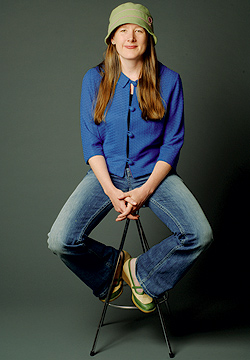 |
At 33, the Wilmette-born playwright has already come close to a Pulitzer and won a MacArthur fellowship. Now, in Passion Play, at the Goodman, she tackles her most daring subject matter yet: what happens to our core beliefs when history—and politics—shift around us. The first of two new plays by Ruhl to land in local theatres this season (the other, Dead Man’s Cell Phone, opens at Steppenwolf in March), Passion Play covers nearly 500 years of history, from Elizabethan England to Nazi Germany to Reagan-era South Dakota. Chicago spoke to the Manhattan-based writer, now the mother of an 18-month-old.
Even though the first act is set in Elizabethan England, your work seems connected to our current situation here.
Ruhl: Absolutely. The way politics and religion have been conflated in the present age reminds me of how politics and religion were conflated in the Renaissance age—going to war for religious reasons. . . . This is the stuff of Elizabeth, but it’s also the stuff of Washington, D.C., right now.
Why did you choose to set the second act in Nazi-era Germany?
Ruhl: I read a book by James Shapiro about Oberammergau . . . the first people to join the Nazi Party were in this little town; the man who played Jesus [in the town’s Passion Play] was one. I was fascinated by the idea of this village promulgating itself as a moral bastion and also being Nazified.
But the Nazis were good at co-opting Christianity, and Hitler was charismatic.
Ruhl: Yes, that’s true, and he was a great actor, in a sense. The question of charisma and leadership fascinates me.
You’re interested in political leaders turning themselves into theatrical icons; is that a comment on real life?
Ruhl: Bush? There’s the famous flight suit, which is so appalling in retrospect, making himself into a war hero and really staging it.
You’ve wondered what happened to “the founding fathers’ rationale for separating church and state.” Tell me, what happened?
Ruhl: I think it was Reagan. It was the way he radicalized that wing of the Right and talked about school prayer and abortion. [And] Clinton. He lost the moral ground for the Left. Why can we not talk about morality without talking about religion? Politics feels like it’s all image right now, iconography.
You were raised Catholic. How does that factor in?
Ruhl: There’s something about your first religion: It provides a framework for how you see the world. In a way, Catholicism was my first language—guilt, sexuality, women having power or not having power.
Your Passion Play clocked in at 3:40 in the Arena Stage in Washington, D.C., where it premièred.
Ruhl: It [moves] through 500 years of history. . . . It’s not for the faint of heart.
Passion Play runs Sept. 15th through Oct. 21st at the Goodman Theatre, 170 N. Dearborn St. For tickets, go to Goodmantheatre.org or call 312-443-3800.



